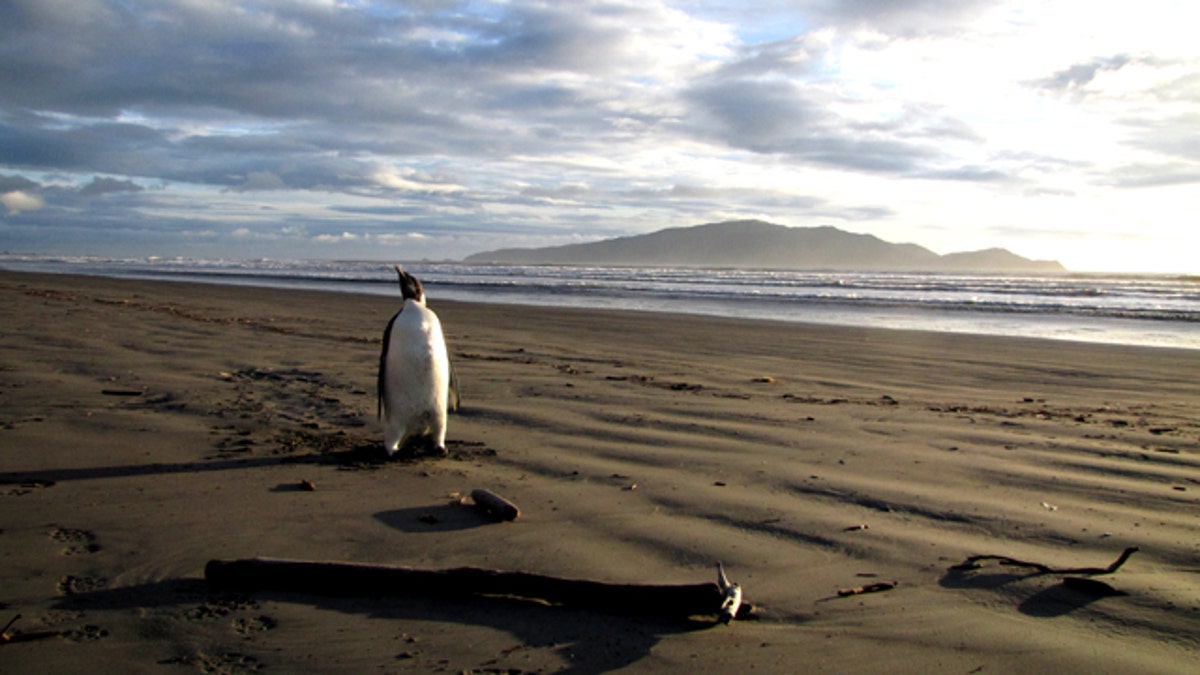
June 20, 2011: A young Antarctic Emperor tgook a rare wrong turn and ended up stranded on a New Zealand beach -- where it became sick after eating sand it mistook for snow. (AP Photo/Richard Gill, Department of Conservation)
WELLINGTON, New Zealand – New Zealand's favorite penguin visitor is more lively and eating fish after undergoing endoscopic surgery Monday to remove the beach sand and twigs it swallowed, apparently mistaking it for snow.
Full recovery for the young emperor penguin -- affectionately dubbed Happy Feet -- may take months, and officials are unsure when or how it could return home to the Antarctic, about 2,000 miles away.
The bird was recovering well after the an endoscopy performed by one of New Zealand's leading surgeons -- for human patients.
Doctors at the Wellington Zoo guided a camera on a tube through the penguin's swollen intestines and flushed its stomach to remove the swallowed sand and pieces of driftwood. Penguins eat snow to hydrate themselves during the harsh Antarctic winter.
To ensure the health of its newest star, the zoo brought in Wellington Hospital specialist John Wyeth to help with the procedure, New Zealand Press Association reported.
Monday's surgery went well, and doctors removed about half of the remaining sand and several twigs from the bird's digestive system, zoo spokeswoman Kate Baker said. Medical staff hope the rest of the debris will pass naturally, but an X-ray is scheduled for Wednesday.
"It's positive news, but he's definitely not out of the woods yet," Baker said.
The penguin is now dining on fish slurry and has been standing and appearing more active than when it arrived, Baker said. The bird was moved to the zoo Friday after its health worsened on the beach.
The penguin is being housed in a room at the zoo chilled to about 46 degrees Fahrenheit, Baker said, and has a bed of ice on which it can sleep.
Happy Feet, nicknamed from the 2006 animated movie, was discovered last week on a North Island beach, the first spotting of an emperor in New Zealand in 44 years. Emperors typically spend their entire lives around Antarctica.
After landing on Peka Peka Beach last week, the penguin appeared health at first, but it became dehydraded, suffered heat exhaustion and was eating large amounts of sand.
What's next for Happy Feet still remains to be decided.
Peter Simpson, the program manager of diversity for the Department of Conservation, said he is meeting with penguin experts Wednesday at the zoo to consider options. He said it's not simply a matter of tossing the penguin back into the ocean off New Zealand's coast.
"There's no great rush to decide," Simpson said. "It will most likely need more medical work over the next three months."
Simpson said the penguin will likely remain at the zoo for that time while it recovers.
Gareth Morgan, a New Zealand investment adviser, has offered to transport the penguin back to Antarctica next February when he leads an expedition to the southern continent. But Simpson said that, while officials appreciate the offer, they may want to act before then.
Simpson said the penguin may be older than experts first thought -- perhaps up to 2 1/2 years old rather than the initial estimate of 10 months. It stands about 3 feet high.
Experts still don't know if it's a male or female, Simpson said, although DNA samples should soon provide an answer.








































